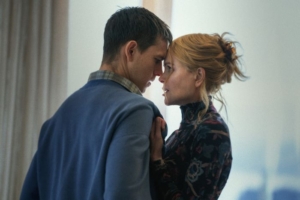
Nadezhda Markina in ELENA (Zeitgeist Films)
![]() Sometimes a festival jury gets it right, recognizing an unknown filmmaker who more than lives up to expectations. In this case it’s Russian director Andrey Zvyagintsev, the 2003 Golden Lion winner at Venice for his richly atmospheric and mesmerizing feature debut, The Return. Even watching this previous film—a terse and tense family drama—on Netflix Instant won’t lessen its visual impact.
Sometimes a festival jury gets it right, recognizing an unknown filmmaker who more than lives up to expectations. In this case it’s Russian director Andrey Zvyagintsev, the 2003 Golden Lion winner at Venice for his richly atmospheric and mesmerizing feature debut, The Return. Even watching this previous film—a terse and tense family drama—on Netflix Instant won’t lessen its visual impact.
His newest and third film, Elena, is leaner and meaner. You’re immediately forewarned that its tone and temperament belongs to the minimalist Cinema of the Austere. In the opening series of static shots, very little seems to be happening. A woman in her early fifties wakes up, alone. Zvyagintsev cuts to the kitchen furnished with the latest appliances, where she makes breakfast, followed by a wide shot in which she enters another bedroom to wake up a man. (The ambiance is so muted that you’ll feel self-conscious crunching on popcorn). Even the aqua blue-and-gray apartment is serenely cool. However, underneath the surface (both of the title character and the film) lies a white-hot family power struggle over money waiting to erupt.
At first, Elena might as well be the housekeeper for the leonine-like man in his seventies, Vladimir (Andrey Smirnov), a former military officer, who has emerged from the U.S.S.R.’s dissolution enriched and unscathed. The two go about their early morning routine on automatic pilot. No carnal warmth, barely a peck on the cheek. Like a domestic servant, Elena knows her place. She’s obedient, soft spoken, and doesn’t vainly attempt to turn back the clock in the way she looks. From morning to night, they live separate lives. He stays cloistered in his bedroom watching soccer; she sits in living room watching lifestyle TV shows. It then comes as a bit of a surprise, actually one of many, when he takes her into bed in the middle of the afternoon.
One tip-off of what’s to come is the strategic use of Philip Glass’s Symphony No 3 that adds an undercurrent of tension and urgency during Elena’s trek from her orderly apartment to her adult son’s graffiti-scarred concrete high-rise on the city’s outskirts, a leftover dinosaur from the Soviet era. (The art direction and the locations inform the characters as much as the straight-to-the-point dialogue). With great economy, Zvyagintsev paints a picture of Elena’s family’s history, and presumably the squalor she left behind when she married Vladimir. Now in his thirties, Sergey (Alexey Rozin) drinks beer in the middle of the day, and his teenaged son Sasha lobs a spit ball off the balcony to see how long it takes to go splat.
After Elena gives him money that she has withdrawn from her own bank account, he ignores her and huddles with his son to play noisy video games in another room. He’s coaxed into joining Elena and his wife in the tiny kitchen, where he slumps in his chair and puts his mom right on the spot: will Vladimir give her the money for Sasha’s university tuition? If not, he’ll have to enlist in the army. (No one on screen asks, can the kid even get into a school?)
The issue of money is so tense for Elena that she makes her request on Sasha’s behalf via a note she leaves on Vladimir’s nightstand. Over breakfast, he says nothing. She asks him if he had read it. He has, and he firmly answers, “I live with you, not your relatives.” The only card Elena has up her sleeve is to remind him that his partying prodigal daughter from a previous marriage, Katya (Elena Lyadova), is no different from her son—both are perpetually unemployed. He admits she’s given in to “life’s pleasures,” but they’re not the same, which is true. Katya is articulate, so adroit at word games that she might have made an excellent lawyer actually. She’ll later tell her dad that she only drinks and does drugs on the weekend, and you can be sure she swigs a vintage that Sergei could only dream of buying.
The director offers pieces of exposition here and there, continuously building the characters through the most offhand of gestures and details (like the way Elena tucks her hair behind her ear). He nudges you to look beneath the banalities, and clearly draws a line in the sand that separates the bitterly blended family, only to erase it as the film goes on. In time, he challenges your attitude toward the family. Many scenes are brief or elliptical, but the script fleshes out the characters to the point where you can imagine their lives off screen. Though Elena (amazingly, this is the first major film role for the actress Nadezhda Markina) and her stepdaughter appear in only a few scenes together, the tension and animosity between them is palpable. The rancor, kept at a barely civil mid-simmer, leaves the audience wanting more, not for clarification, but solely because it’s so absorbing.
















Leave A Comment